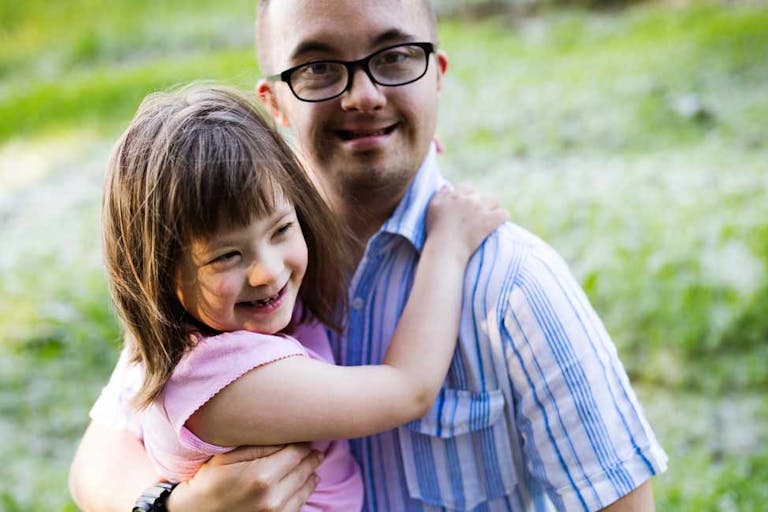
Welsh women denied needed pregnancy medication are getting abortions
Cassy Cooke
·
Human Rights·By Carole Novielli
AMAZING: Study showcases the positive capabilities of people with Down syndrome
An amazing study which reveals positive developmental assessments of people with Down syndrome was recently published in the American Journal of Medical Genetics (AJMG). Authors Gert de Graaf, Susan P. Levine, Richard Goldstein, and Brian G. Skotko, attempted to document a “realistic assessment of the range of functional abilities found in people with Down syndrome” so more accurate information might be used to “assist in counseling expectant parents.” Authors asked parents of children with Down syndrome from the United States and the Netherlands to assess 11 functional skills of their sons and daughters, and found that the majority of people with Down syndrome in the United States:
can walk by 25 months of age.
can speak reasonably well by 12 years.
can maintain their own personal hygiene by 13 years.
can work independently by 20 years.
“Previous research has documented that expectant couples often feel that they receive incomplete and inaccurate information during prenatal counseling,” The AJMG study discovered.
Authors also found that “scant research has assessed the functional skills attained by people with Down syndrome.” An analysis of the study’s findings published by the Charlotte Lozier Institute (CLI) found that “the results provide actual benchmarks to assist treatment providers and to encourage expectant parents.”
Findings regarding children with Down syndrome (Ds), according to CLI, also included:
Walking – The majority of U.S. children with Ds walk by 25 months. Among the Dutch, 36% of children with Ds walk reasonably well by age two and 70% by age three. Overall, the difference in walking disappeared by age five.
Speaking – The majority of U.S. and Dutch children with Ds spoke in a comprehensible manner by age 12.
Reading – 48% of U.S. adults and 63% of Dutch adults with Ds read reasonably well by ages 21 to 30.
Writing – 37% of U.S. adults and 52% of Dutch adults with Ds wrote reasonably well by ages 21 to 30.
Eating – Nearly all U.S. and Dutch adults with Ds ate reasonably well by adulthood.
Meal preparation – 45% of U.S. adults and 30% of Dutch adults with Ds prepared their own meals by age 31.
Self-hygiene – The majority of children with Ds took reasonable care of their own self-hygiene by 13 years of age. The number rose to about 70% by ages 21 to 30.
Employment – 71% of U.S. adults and 65% of Dutch adults with Ds worked jobs by age 31.
Dating and going out – 25% of US adults dated by age 31. 61% of Dutch adults would go out (including with friends) by age 31.
Independent travel – 30% of U.S. adults and 17% of Dutch adults with Ds traveled independently by age 31.
Independent living – 34% of U.S. adults and 30% of Dutch adults with Ds lived independently by age 31.
Although the United States does not collect meticulous statistics on how many babies with Down syndrome are aborted, a 2012 publication in Prenatal Diagnosis estimated a 67 percent termination rate following prenatal diagnosis of babies with the condition.
“Evidence suggests that termination rates are lower than noted in a previous review that was based on less contemporary studies and had an international focus,” the report states. But although the number is high, it is surprisingly lower than other countries like France (77%/2015) and Denmark (98%/2015) according to CBS News. In Iceland, major media outlets including Fox News say the numbers are much higher. CBS reported that “in the early 2000s, the vast majority of women — close to 100 percent — who received a positive test for Down syndrome terminated their pregnancy.”

Article continues below
Dear Reader,
In 2026, Live Action is heading straight where the battle is fiercest: college campuses.
We have a bold initiative to establish 100 Live Action campus chapters within the next year, and your partnership will make it a success!
Your support today will help train and equip young leaders, bring Live Action’s educational content into academic environments, host on-campus events and debates, and empower students to challenge the pro-abortion status quo with truth and compassion.
Invest in pro-life grassroots outreach and cultural formation with your DOUBLED year-end gift!
A fact sheet published by two of the medical experts who authored the AJMG study noted that, “In the few decades since prenatal screening was introduced, more pregnancies with Down syndrome have been diagnosed prenatally and terminated.” The authors estimated that “approximately 3,200 Down syndrome-related elective pregnancy terminations performed as of 2013 in the U.S.” Tragically, the fact sheet also claimed, “in the U.S., as a result of elective terminations, we estimate there was a 31% reduction in the numbers of babies with Down syndrome born in 2013. This means that in recent years there were 31% fewer babies with Down syndrome than could have been born, absent elective terminations.”
READ: Ukrainian man becomes first with Down syndrome to earn bachelor’s degree
Live Action News recently highlighted the amazing accomplishments of Karen Gaffney, the first person with Down syndrome to swim the English Channel. In the video below, Karen says, “Ending the life of an unborn child because he or she will have a disability is wrong, it is very, very wrong. This comes from a belief that people with disabilities are weak and need to be weeded out from society. This view is unjust, tragic, and deserving of international outrage. It has no place in a world that stands for basic human rights.”

Live Action News has documented additional stories about people with Down syndrome who are helping to dispel the false ideas that many in society have about those with the condition:
John Cronin, founder of “John’s Crazy Socks,” won the Ernst and Young Entrepreneur of the Year Award for the New York region.
Charlotte Fien is a student at the University of London and has spoken at the United Nations.
Frank Stephens is an actor and Special Olympian who previously addressed the United Nations.
Kayla McKeon is a motivational speaker, university student, and Special Olympian.
Jamie Brewer is an actress in the horror series American Horror Story and the first model with Down syndrome to walk the runway at New York Fashion Week.
Ángela Bachiller was the first elected public official in Spain with Down syndrome.
Blake Pyron is Texas’ first business owner with Down syndrome.

These important benchmarks now being observed in people with Down syndrome support the case for medical professionals to give parents life affirming information about the condition. No matter a person’s achievements or abilities, every human life (born and preborn) is valuable and should be cherished and protected.
“Like” Live Action News on Facebook for more pro-life news and commentary!
Live Action News is pro-life news and commentary from a pro-life perspective.
Contact editor@liveaction.org for questions, corrections, or if you are seeking permission to reprint any Live Action News content.
Guest Articles: To submit a guest article to Live Action News, email editor@liveaction.org with an attached Word document of 800-1000 words. Please also attach any photos relevant to your submission if applicable. If your submission is accepted for publication, you will be notified within three weeks. Guest articles are not compensated (see our Open License Agreement). Thank you for your interest in Live Action News!

Cassy Cooke
·
Human Rights
Carole Novielli
·
International
Angeline Tan
·
Human Rights
Nancy Flanders
·
Human Rights
Angeline Tan
·
Human Rights
Angeline Tan
·
Abortion Pill
Carole Novielli
·
Investigative
Carole Novielli
·
Human Rights
Carole Novielli
·
Abortion Pill
Carole Novielli
·
Investigative
Carole Novielli
·